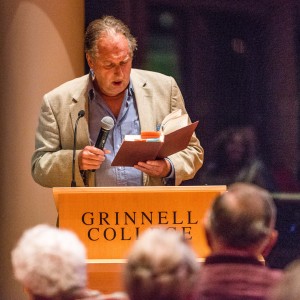Elkader, Iowa, a town with a population of approximately 1,300 people in the northeastern part of the state, has a surprising namesake with an interesting backstory. Elkader is named for an Algerian Muslim leader who never stepped foot in Iowa. This past week’s symposium, “A Muslim Saint in Iowa,” sought to explain the strange connection of the Emir Abd el-Kader to Iowa.
The Emir was an impressive academic and religious scholar, but found himself leading his people against attack from the French in the mid-19th century. Across the world, at that same time, a group of men founded a town in Iowa and—impressed with his accolades, as well as reports of his compassion during a time of military intervention—named their town after him.
Flash-forward to six years ago, when Grinnell’s Professor Jan Gross, French and Arabic, took her family and an Algerian visitor to try an Algerian restaurant in Elkader and tour the town. Learning more about the town on that trip was one of the main moments that inspired the symposium this week, which Gross put on with help from Professor Emeritus Harold Kasimow, Religious Studies, and other sponsors.
“I just think it’s a really great story,” Gross said. “It’s important for us to realize that a town actually has a possibility of becoming a kind of leader in connecting across cultures, across religions and across history in a way.”
The symposium began on Sunday, Sept. 21, with a 2 p.m. showing of the film “Of Gods and Men,” which took place at the Strand Theatre downtown. John Kiser, the author of a book that was used as a main source for the film, spoke before the movie and entertained questions from a full crowd afterwards.
“The film was certainly the kickoff point,” Gross said on Wednesday. “I think without the film, it might not have had the same legs.”
The symposium continued Monday with a joint talk from Gross and Kiser titled, “From Abd el-Kader to Elkader: Stories of Connection to Iowa, Islam and Algeria.”

Photo by Chris Lee
During Kiser’s portion of the talk, he spoke in JRC 101 about his book, “Commander of the Faithful: The Life and Times of Emir Abd el-Kader.” He addressed why he, a Midwesterner with no ties to the Arab world, spent six years writing a book about Abd el-Kader, whom he likened to a mix of John Winthrop, because of his moral values, Robert E. Lee for his loyalty and George Washington, because he is considered a father of his country.
“One of the reasons I was writing the book at a fundamental level was because it’s about struggle,” Kiser said. “In his case, struggle against invasions, struggle against depression in prisons, struggle against the isolation of being in exile and problems there and the continuing lifelong struggle for knowledge and truth.”
Abd el-Kader famously showed sympathy for Christians, despite the fact that his country was invaded by Christians, illustrating his commitment to human rights for all, regardless of religious background. Kiser showed his admiration for Abd el-Kader and discussed his ability to be a religious man, but also a universalist. Kiser also shared the most important reason that he wrote his book.
“We need badly a good Arab story. A good Muslim story. We don’t read about it too often,” he said. “But this is more than [that]. This is a good human-being story.”
During the question-and-answer segment of Kiser’s talk, which was very conversational, the crowd inquired about his opinions of Islam as a whole. At one point, he seemed unsure of who wrote a source that he used in his book and was corrected a couple of times by the audience on facts about Islam, which disturbed at least one attendee.
Nora Sahel ’17 found the life of Abd el-Kader and his connection to Iowa to be of great interest and enjoyed Kiser’s talk, but thought the question-and-answer portion was slightly disappointing.
“I felt like he did lose a little credibility in terms of his knowledge of Islamic studies,” she said. “I felt like he had much more extensive knowledge of [the] Emir Abd el-Kader, but not necessarily Islam.”
“[Kiser] is an incredible storyteller and is very accurate and precise historian,” Gross said. “However, he’s also a human being who has his own opinions and thoughts, and while we don’t always agree … we understand that we come from different experiences and he’s very willing to listen.”
The symposium continued on Tuesday morning, when an instructive discussion was held at Drake Community Library, titled “Creating Educational Outreach.” The discussion focused on the Abdelkader Education Project: a movement to revive the legacy of Abd el-Kader which features its own essay contest.
Also on Tuesday, a panel was held in JRC 101. The panel featured Kasimow, Seton Hall University professor Gisela Webb, Kiser, Rashed Chowdhury ’03 and Katie Chowdhury ’05, who talked about religious leaders—not just Abd el-Kader—over the past millennium and their role in proving the importance of interfaith cooperation.
“In my experience, [interfaith] dialogue has had many functions,” Katie Chowdhury said. “It can help us work together for social justice. It can make friends. It can reduce violence or reduce stereotypes about each other. And for me, what I’ve gotten out of it and what I really enjoy is it increases my own faith.”


































































Rashed Chowdhury '03 • Sep 26, 2014 at 5:29 pm
Good article overall, but as someone who was present at Kiser’s talk and took part in the Q&A, I can tell you that the portion about how the Q&A went is inaccurate. The author of the article says that John Kiser “was corrected a couple of times by the audience on facts about Islam”. That is incorrect. What happened was that I, as well as a current Grinnell student, addressed a question raised by Prof. Don Smith of the History Department. We were not correcting John Kiser, but rather trying to explain a point Kiser had made to Prof. Smith.